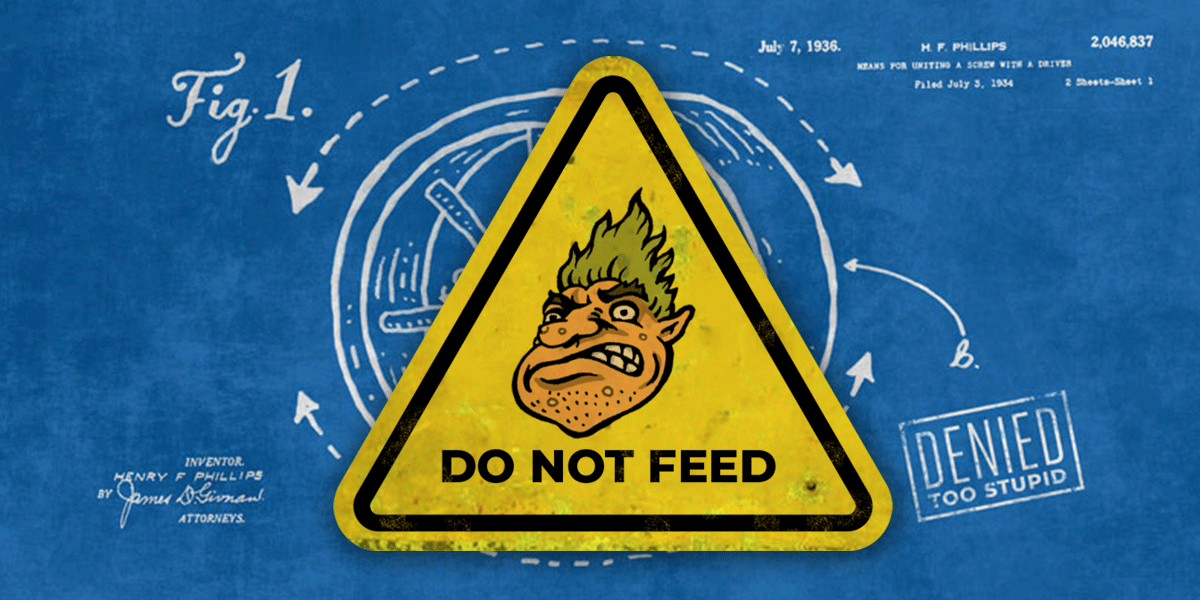|
Getting your Trinity Audio player ready...
|
The U.S. Senate Subcommittee on Intellectual Property will debate a bill this week that would dramatically limit the public’s right to challenge bad granted patents. The PREVAIL Act, S. 2220 would bar most people from petitioning the U.S. Patent and Trademark Office (USPTO) to revoke patents that never should have been granted in the first place.
If the bill passes, it would be a giant gift to patent trolls, who will be able to greatly increase the extortionate toll they demand from small businesses, software developers, and everyday internet users. EFF opposes the bill, and we’re reaching out to Congress to let them know they should stand with technology makers and users—not patent trolls.
The PREVAIL Bill Will Ban Most People From Challenging Bad Patents
Every year, hundreds of patent lawsuits are filed over everyday internet activities–“inventions” like watching ads (online), showing picture menus (online), sharing sports data (online), selling binders or organic produce (online), or clocking in to work (online).
The patents are usually controlled by “patent assertion entities,” also called patent trolls, which don’t actually do business or use the ideas themselves.
There are two main ways of fighting back against these types of bogus patents. First, they can be invalidated in federal court, which can cost millions of dollars. Second, they can be challenged at the U.S. Patent and Trademark Office, usually in a process called an inter partes review, or IPR. The IPR process is also expensive and difficult, but this quasi-judicial process is much faster and cheaper than district courts. IPR has allowed the cancellation of thousands of patent claims that never should have been issued in the first place.
The PREVAIL Act will limit access to the IPR process to only people and companies that have been directly threatened or sued over a patent. No one else will have standing to even file a petition. That means that EFF, other non-profits, and membership-based patent defense companies like Unified Patents won’t be able to access the IPR process at all.
EFF used the IPR process back in 2013, when thousands of our supporters chipped in to raise more than $80,000 to fight against a patent that claimed to cover all podcasts. EFF was able to present prior art (earlier technology), and the judges at the Patent Office agreed that the so-called “podcasting patent,” which belonged to a patent troll called Personal Audio LLC, should never have been granted. The patent was knocked out and although the patent owner appealed all the way to the Supreme Court, our win was upheld at every stage.
We’re not the only non-profit to use IPRs to protect users and developers. The Linux Foundation, for instance, funds an “open source zone” that uses IPR to knock out patents that may be used to sue open source projects. Hundreds of patents per year are litigated against open source projects, the great majority of them being owned by patent trolls.
Challenges Matter Because Most Software Patents Were Wrongly Granted
Patents are a government-granted monopoly that lasts 20 years. The owners of those monopoly rights often want payment from those who use the method or system they claim to “own.” These are vast and broad claims–particularly the ones used by patent trolls, which will sue dozens of companies that have very different ways of doing things.
When a patent troll comes along like Lodsys, which threatened hundreds of independent app developers over online payment technology, software makers shouldn’t have to wait until they get a threat letter in the mail to fight back. What’s more, funding defensive measures like IPRs through crowdfunding or membership-based systems are critical to making them accessible to everyday people.
The government gives out software monopolies in the name of spurring innovation. But the Patent Office gets it wrong very, very often. Roughly half of patents litigated to judgment are found invalid (even though the legal standard heavily favors issued patents), and one study found the most heavily-litigated patents win in court only 11% of the time.
There’s a growing body of evidence that patents don’t work to spur software innovation, and in fact do harm. The least we should be allowed is the right to bring evidence forward to challenge the most abused monopoly rights.
The PREVAIL Act Tilts The Table In Favor Of Trolls At Every Step
The bill tweaks the patent challenge system in other ways too, nearly all of which favor patent trolls and a few large patent-owners.
First, the PREVAIL Act greatly raises the standard of evidence needed to invalidate a patent. If it passes, the Patent Trial and Appeal Board will presume that the patent claims are valid unless the challengers carry a heavy burden to show otherwise. Right now, the legal standards for inter partes review are roughly aligned with the standards for issuance of proposed patent claims. That alignment is what makes IPR a true opportunity for the PTO to reconsider the issuance of patent claims.
Second, the bill would require parties that file IPR challenges to give up their right to fight in federal court. This doesn’t make any sense. Certain arguments, like arguing that a patent is abstract and ineligible under the Alice precedent, can only be made in district court. Choosing to present prior art arguments at the Patent Office shouldn’t bar someone who has been targeted by a patent troll from being able to properly defend themselves in court. Ultimately, it’s only a judge or jury that can decide a patent has been infringed—and award damages. Anyone accused of patent infringement must have all defenses available to them when they face such a proceeding.
Third, when patents get invalidated, PREVAIL allows patent owners to simply add new claims that avoid the issues presented before the court. The owners get to do this with the benefit of years of hindsight, and new information about what real innovators have found to be successful in the market. Combined with the waiver of the ability to later challenge validity in court, this is clearly a raw deal for the public and anyone on the receiving end of a patent threat.
Finally, the bill gives the USPTO Director the power to throw out petitions in cases where more than one petition challenges the same patent. But it makes perfect sense for there to be multiple challenges over the most controversial, heavily litigated patents. The same patent or group of patents is often used to threaten hundreds–or even thousands–of small businesses. There shouldn’t be a race to the door where only the first challenger (who might not be the best challenger) gets their case heard.
But that’s exactly what will happen if PREVAIL passes. Even a patent that’s been used dozens of times will only have to face one challenger at the USPTO, even if the two challengers bring forth very different arguments and evidence. Given that there are so few limitations on who patent owners can threaten and sue, it’s unfair to place harsh limits on the comparatively few people or companies that have the desire, and the resources, to fight back against wrongly granted patents.
Congress Should Allow More Challenges to U.S. Patents, Not Fewer
The PREVAIL Act proceeds from a misguided, evidence-free belief system that attributes innovation and economic success to government idea-monopolies. The evidence is growing that the U.S. software industry thrives in spite of software patents, not because of them.
There are useful ways we could change the IPR system. In 2021, EFF supported a bill brought by then-Senator Patrick Leahy brought forward a bill that would have updated the IPR system and closed four loopholes in the system. Importantly, that bill expanded access to IPR–it didn’t shrink it.
In fact, the public benefits from challenging bad patents. We could go even further in expanding patent challenges, and it would be to the public’s benefit. For instance, we could allow patent challengers to explain when a patent shouldn’t have been issued because it claims abstract ideas, which aren’t patentable per Section 101 of the Patent Act. Those arguments currently aren’t allowed during IPR proceedings.
The forces behind this bill represent patent trolls and other large-scale patent enforcers. In the end, the IPR process has benefited the public, but it’s been a net loss for a small group of people and companies that have made a lot of money from asserting patent threats. That’s why we’ve seen continuous efforts to destroy the IPR process, including misguided court challenges and pushing harmful rule changes at USPTO to limit its effects.
The PREVAIL Act will do far more harm than good, and we’ll be calling on lawmakers in Congress to oppose this bill.



